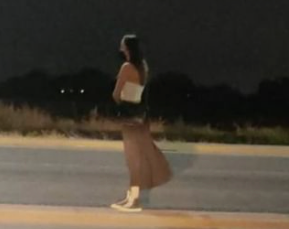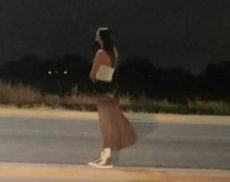Debanhi Escobar: Taxi driver who took haunting final photo of slain Mexico teen ‘tried to grope her chest’
Images purportedly show the driver reaching for Escobar after she got into the back seat of his car

Your support helps us to tell the story
From reproductive rights to climate change to Big Tech, The Independent is on the ground when the story is developing. Whether it's investigating the financials of Elon Musk's pro-Trump PAC or producing our latest documentary, 'The A Word', which shines a light on the American women fighting for reproductive rights, we know how important it is to parse out the facts from the messaging.
At such a critical moment in US history, we need reporters on the ground. Your donation allows us to keep sending journalists to speak to both sides of the story.
The Independent is trusted by Americans across the entire political spectrum. And unlike many other quality news outlets, we choose not to lock Americans out of our reporting and analysis with paywalls. We believe quality journalism should be available to everyone, paid for by those who can afford it.
Your support makes all the difference.The investigation into the death of Debanhi Escobar, the young woman whose body was found in the cistern of a motel in Nuevo León, Mexico, has taken a new turn as the victim’s father accused a taxi driver whom she hired to take her home of trying to grope her.
According to the Mexican newspaper Milenio, journalist Azucena Uresti gained exclusive access to the images that allegedly show the driver, identified as Juan David Cuéllar, 47, reaching toward Escobar’s chest after she got in the backseat of his car.
Mr Cuéllar is believed to have picked Escobar up at 4.20am on 9 April. Five minutes later she exited the vehicle on an empty stretch of highway. The driver then snapped a photo of Escobar standing on the side of the road. The haunting image went viral amid a 13-day search for the 18-year-old law student.
The investigation has indicated that at 4.30am, Escobar unsuccessfully sought help at a facility owned by the trucking company Alcosa Transportes Internacionales. Security cameras on the site then captured her walking toward the Nueva Castilla Motel - marking the last time she was seen alive.
Mr Cuéllar, who works for Uber and Didi, picked up Escobar outside of those platforms. The young woman’s friends reportedly called him from the Venezia estate to retrieve her from a party.
Mr Cuéllar is said to have told police Escobar had gotten out of his vehicle after a confrontation between the pair, but no further details are known.
Escobar’s father points finger at taxi driver
Escobar’s father, Mario Escobar, placed blame on Mr Cuéllar at a press conference outside the motel, saying he put her in danger by trying to abuse her. “I publicly accuse Juan David Cuéllar of all this,” he told reporters.
Both Mario Escobar and his wife, Dolores Bazaldúa, have also accused the Nuevo León prosecutor, Gustavo Adolfo Guerrero, of incompetence and alleged that Escobar’s body was planted in the cistern. They also said the prosecutor’s office ensured that "there was no crime to prosecute,” despite evidence that the taxi driver tried to abuse Escobar.
"I was wrong to trust the prosecutor’s office, I apologize," Mario Escobar said, visibly dismayed.
The Attorney General’s office put forward the theory that Escobar had accidentally fallen into the motel’s cistern and drowned after suffering a severe concussion. The young woman’s family say that this version is a "lie" and believe that Escobar was beaten and strangled.
Escobar’s parents also questioned the fact that for 13 days, authorities used more than 200 officers, drones and search dogs to search the Nueva Castilla Motel at least four times and found nothing. The discovery of the body wasn’t made until the hotel workers complained of foul odors coming from the cistern.

‘Massive human error’
Due to the errors and omissions that the investigation has presented so far, even the Secretary of State Security of Nuevo León, Aldo Fasci, called the case "a massive human error”.
Authorities have also faced scrutiny for failing to focus more on Mr Cuéllar’s involvement.
Mr Cuellar, who is also known as Jesús, has a long criminal history - including a 12 April arrest on drug-related charges.
Although authorities have questioned him about the Escobar case, he has not been accused of being related, in any way, to her disappearance or death, so he is not in custody.
Reports claim he was previously investigated for harassment and attempted kidnapping of women.
Escobar joins the long list of dead and missing women in Nuevo León. The state’s governor, Samuel García, reported that 327 missing persons reports were filed between the start of 2022 and 17 April. Of those, 289 were found alive, 33 remain unaccounted for and five were found dead.
Gender violence against women is not a new phenomenon in Mexico, but each year it grows significantly. According to the Executive Secretariat of the National Public Security System, the country registered 1,004 femicides in 2021; 978 in 2020, and 973 in 2019.
In a recent report, the UN Committee on Enforced Disappearances described this phenomenon as alarming and called on the government to take urgent measures. The Committee points out that not only organized crime is responsible, but also federal, state and municipal authorities.


Join our commenting forum
Join thought-provoking conversations, follow other Independent readers and see their replies
Comments